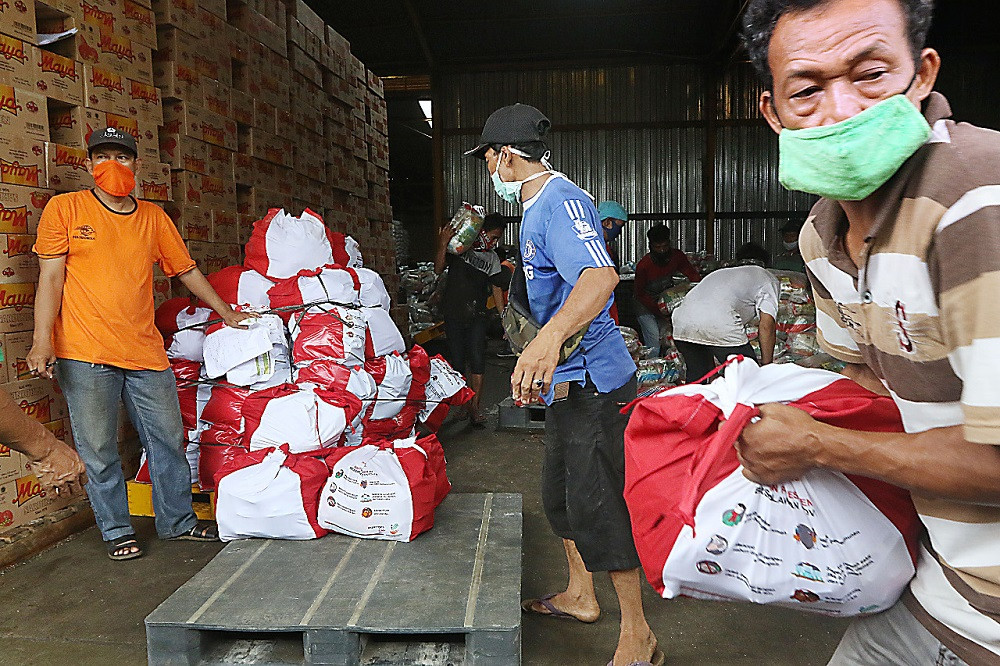Popular Reads
Top Results
Can't find what you're looking for?
View all search resultsPopular Reads
Top Results
Can't find what you're looking for?
View all search resultsTax foodstuffs and then give money to the poor to buy them
This seems completely out of character for the supposedly pro-poor government of President Joko “Jokowi” Widodo.
Change text size
Gift Premium Articles
to Anyone
D
esperate times call for desperate measures. But is the government so desperate that it will even start taking money from the poor? With revenue from income taxes falling drastically during the economic recession, the government is planning to tax basic foodstuffs to cover a gnawing deficit in its spending plans.
Bad idea, critics say. Taxing basic foodstuffs would lead to an increase in prices and this would badly hurt the poor who are already struggling with falling income, and many of them even losing jobs, in the past year.
As if rubbing salt in the wound, critics notice that the government has given generous tax breaks to corporations, and waived luxury tax on certain types of cars, as stimulus to speed up the current economic recovery.
You cannot ask for a more perfect narrative to portray an evil empire that is taking money from the poor and giving it to the rich. This seems completely out of character for the supposedly pro-poor government of President Joko “Jokowi” Widodo.
What is missing in this picture are the huge sums of money the government is spending to help the poor deal with the impact of the economic recession. There is the cash assistance program that replaced the previous food packets given out to the poor. There is the new preemployment card scheme that provides both cash and vocational training, not only for young people seeking jobs, but also those who have been laid off.
The majority of people, rich and poor, also benefit from free vaccines as the government rolls out the national vaccination program to inoculate some 180 million people to fight the COVID-19 pandemic.
These social programs, in addition to the provisions of free schooling and low-cost healthcare services, are paid out of the tax money the government collects from the people.
You cannot accuse the government of hurting the poor. They are the biggest beneficiaries of many of the social programs.
The plan to tax basic foodstuffs is part of the massive tax reform programs being discussed with the House of Representatives. It is part of President Jokowi’s grand vision to transform Indonesia into a modern economy by broadening the tax base, which is among the lowest in Asia. This means that more people will have to start paying income taxes, and most, if not all goods and services, will be subject to tax.
Currently, a selected number of goods and services are exempted from value-added taxes (VAT). They include foodstuffs that fall under the category of the nine basic commodities (sembako). The full list has expanded beyond nine, and it includes rice, sugar, cooking oil, meat and vegetables. School enrollment and tuition fees are also exempted, but since the government runs free schooling programs, this only affects privately run schools.
In 2019, these VAT exemptions cost the government Rp 73.4 trillion (US$5.25 billion), according to a kompas.com report quoting the Danny Darussalam Tax Center. Of this, Rp 29 trillion covered the exempted basic foodstuffs. Eliminating the exemptions would bring in that much money to government coffers.
But this is not only about the money; it is also about fairness.
With everybody paying the same price for these goods and services, irrespective of their capacity, much of the benefit from the VAT exemption is enjoyed by those who buy the most.
This is not unlike the long-sustained gasoline subsidy program, which is a form of negative tax, where the government pays the difference between the price you pay and the cost. Successive governments failed to phase out the fuel subsidy, which is always a huge spending item. Each time it tried, it faced massive protests that claim that the move would hurt the poor. In reality, it is the rich that has enjoyed the lion’s share of the subsidy.
In fiscal policy terms, tax on consumption has little impact on redistributing wealth. It may even be regressive, as in the case of the fuel subsidy where the rich benefit the most. There is more room for the government to play with income taxes in taking money from the rich and giving it to the poor.
Indonesia already imposes a progressive taxation system and the government is now seeking to increase the highest tax rate from 30 to 35 percent. That may not be progressive enough when other countries have higher thresholds, but it is here that the government can help the poor deal with the anticipated rise in the prices of foodstuffs if it goes ahead with phasing out the VAT exemption.
Keeping food prices low may be the popular way to go for President Jokowi, but it encourages free-riders, with many who can afford to pay reaping the most benefit. Letting their prices increase and then giving help to those in need would be much fairer and more just.
***
Senior editor of The Jakarta Post










